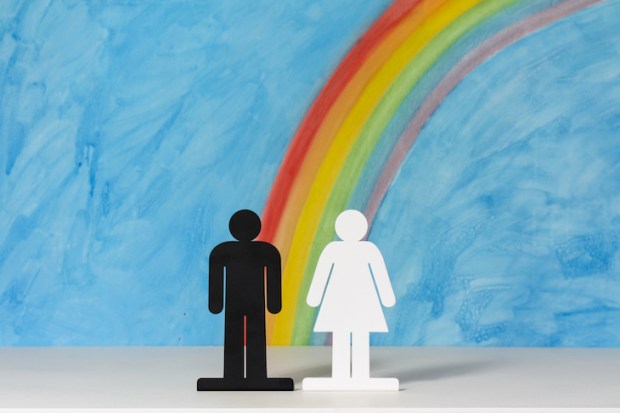Somewhere towards the end of the 1980s I was suddenly promoted three grades upwards in my job at the BBC; a bit like going from the middle of the old fourth division to the top of the Championship. Yay. The immediate consequences were more money, more power and almost endless opportunities for sexual intercourse. Women who had hitherto been averagely amiable work colleagues became much friendlier — and in a very different way. It was as if I’d been transformed overnight from Marty Feldman into Orlando Bloom. What a delightful period of my life that was.
I was happily reminded of it when the actor Martin Clunes stepped into the current sexual harassment debate, perhaps unwisely, suggesting that actresses flirted with producers in a most unseemly manner, which he likened to prostitution. Perhaps he is right, although I don’t think so. I think a less contentious reading would be that women are hard-wired to be attracted to powerful men. Or perhaps they have been schooled to be so by the inequalities in our society — although I doubt that. It seems to me utterly intrinsic. Back at the BBC, the average gap in grades between men and women who were ‘in a relationship’, or shagging one another, was about three. And the male was always in the senior position. Female presenters did not do the cute researcher, even if he was the same age as them or older. Male presenters did the cute female researcher. And so on, all the way up the food chain.
I’m not sure what light this sheds on the current situation, except to suggest gently that there might, in some cases, be two sides to the story. This is a dangerous thing to suggest, because it leaves one open to the accusation of ‘victim shaming’ — indeed, so absolutist is the screeching and the furore that any attempted caveat, any nervously muttered ‘Um, but on the other hand…’ will incur a vilification every bit as extreme as if one had committed these acts of harassment oneself. Simply to hold such a thought would make one an ‘abuse denier’. Denier! Denier! Has any word been more traduced in our current century?
I am not denying that sexual harassment — and worse — has happened, in Hollywood, in the BBC, in Parliament and probably in every office in the land, and that in almost all cases it should be roundly condemned. Simply saying that at the milder end of the spectrum, what is today called harassment may once have been — and might still be — the way in which men and women relate to one another in a working environment. Given the long and proud march of women into employment since the early 1970s, the workplace — rather than one’s home town, or place of education — has become the arena in which we find our partners: assortative mating. The ladies flutter the eyelids, the gentlemen offer to buy them a drink, or perhaps put an arm around the shoulder. Lord Rennard asking an aspiring young Lib Dem politician if she would like to join him for a coffee in his room. Harassment? I really don’t think so.
Take a look at the Harvey Weinstein case. He seems to me to be a repulsive, odious human being. One’s sympathies are surely with the Italian actress Asia Argento, on whom the gargantuan slob ‘forcibly’ performed what the papers refer to as a ‘sex act’.
And perhaps our sympathies should still be with her when we learn that she then, um, went on to have a five-year relationship with Weinstein which involved quite a few more of those ‘sex acts’, I would guess. But should we not at least wonder a little at the real nature of their relationship? That all is not quite how it is presented to the press? That Ms Argento’s anger has been somewhat slow to disclose itself?
And so to Parliament. This one will run and run, I suspect. And in many cases it is a good thing that arrogant and sexist male politicians get their comeuppance. If I were a woman I would not like to be called ‘sugar tits’ by Mark Garnier, or to be despatched by him to buy his dildos. It is true that cabinet ministers are very busy and may not have time themselves to nip out of the office in pursuit of dildos. One answer may be for the House of Commons souvenir shop to stock appropriately tasteful dildos, embossed with the official portcullis trademark, alongside their awful boxes of chocolates and bottles of whisky. Whatever, it is certainly boorish and arrogant behaviour. But Michael Fallon putting his hand, very briefly, on the knee of the journalist and broadcaster Julia Hartley-Brewer? An intrusion for which Fallon apologised once he had received an earful from the excellent Hartley-Brewer, and the two remain good friends? This was a front-page story. A hand on the knee. OK, I would not do it. I don’t think I’ve ever put my hand on a woman’s knee, not even my wife’s — there’s something seedy and kind of Leslie Phillips about it. But should we get outraged about it?
Meanwhile, there are also reports that a senior female Labour MP has been enjoying extramarital relationships with young male researchers. Ah, the exception that proves the rule. I was once a young Labour researcher and would have greatly appreciated a spot of cougaring from some benevolent female member — although at the time I was there my options would have been limited to Margaret Beckett and Judith Hart, so maybe not. But why should this mysterious politician be caught up in the hoo-ha? Isn’t her alleged infidelity a matter for her and her husband? And did the researchers not enjoy their supposed liaisons? And in these transactions, where resided the power? Once you’ve asked that question and hazarded your way towards an answer, the whole basis for these outraged complaints begins to slowly unravel.
Got something to add? Join the discussion and comment below.
Get 10 issues for just $10
Subscribe to The Spectator Australia today for the next 10 magazine issues, plus full online access, for just $10.
You might disagree with half of it, but you’ll enjoy reading all of it. Try your first month for free, then just $2 a week for the remainder of your first year.















Comments
Don't miss out
Join the conversation with other Spectator Australia readers. Subscribe to leave a comment.
SUBSCRIBEAlready a subscriber? Log in